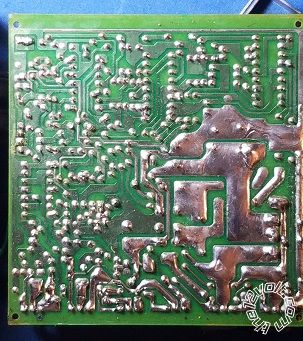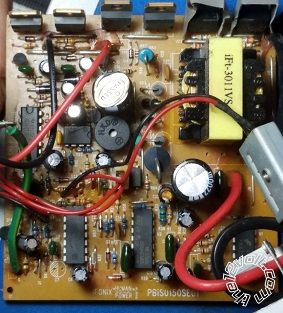Power Inverter Stopped Working?
Printed From: the12volt.com
Forum Name: General Discussion
Forum Discription: General Mobile Electronics Questions and Answers
URL: https://www.the12volt.com/installbay/forum_posts.asp?tid=144619
Printed Date: March 04, 2026 at 9:14 AM
Topic: Power Inverter Stopped Working?
Posted By: jwarren808
Subject: Power Inverter Stopped Working?
Date Posted: July 23, 2018 at 3:48 AM
i have a small 150 WATT power inverter i bought used from a friend for $15, and i have'nt used it much, and last week i tried using my soldering iron off it, with the inverter clipped to my car's battery with car running, and it worked fine, and solder iron got hot and was able to solder.
but i tried using the solder iron again recently, but this time the power inverter did'nt work?, it has a good fuse in it, and my car battery is good and had the car running, and the battery clips on the inverter are connected good to the wires, but the power light did'nt come on when flipping the power switch on, and it never got the solder iron hot this time ?, then i tried hooking the inverter inside my apartment to my portable jumpstart box jump cables and i plugged a desk lamp into it and it did same thing, and power light did'nt come on, and lamp would'nt turn on, but this time it made a single beep sound ?
my soldering iron is 30 WATTS, 110V-120V-60Hz and my power inverter's output voltage range is 110-120 VOLT AC RMS 60Hz, with MAX continous power of 150 WATTS, with surge capability (peak power) of 300 WATTS/0.3 SECOND, and INPUT voltage range of 10.1-15.6 VOLTS DC and INPUT current range of 0.3-15 AMPS, with 20 AMP fuse in it.
my friend told me to open it up and look at the circuit board for any burnt spots or anything else funny, so i slid the circuit board out of it and i did'nt see anything bad on it, but i am posting pics of it here so you can see it.


just wanted to make a post here to see if people can tell me if the power inverter i have is rated good enough where it should be able to work to power the soldering iron i have or if it caused damage to it when i was trying to use it with it ? and also what to check or look for to possibly try to fix it or if i should just throw it in the trash ? any help would be appreciated, thanks
Replies:
Posted By: eguru
Date Posted: July 23, 2018 at 8:23 AM
The soldering iron should not have caused it to fail. These things are usually not worthwhile to troubleshoot beyond checking the fuses and lead wires.
Posted By: jwarren808
Date Posted: July 23, 2018 at 11:16 AM
ok, and yes i did already check the fuse and condition of the lead wires and they were fine.
what about testing the output with a multimeter?, is that something worth checking?
or should i just stop now and chunk it in the trash?, and plan on getting a better quality one later on?
Posted By: Custom_Jim
Date Posted: July 24, 2018 at 3:37 PM
How did you "check the fuse and condition of the lead wires" and determine they were fine ? A visual inspection may not reveal the problem(s) so you could get out your multimeter and start checking for power and ground starting at the 12v plug and then working your way further and further away from the plug and eventually into the circuit board but you have to be careful. With a mulitmeter you can also check the switch electrically to see if it's passing power or ground like it should and a visually perfectly looking switch may have issues inside you cannot see but electrically there are issues. I have also seen glass style fuses that "look" good but on one end inside the end caps the connection is broken.
Jim
-------------
1968 Chevy II Nova Garage Find 2012
1973 Nova Custom
1974 Spirit of America Nova
1973 Nova Pro-Street
Posted By: jwarren808
Date Posted: July 29, 2018 at 9:39 AM
your right, i only did a visual inspection of the fuse and lead wires, and i realise that may not reveal the problem it has, so maybe i'll take your advise and start using my multimeter and start testing for power and ground starting at the 12volt plus and work my way down it, into the circuitboard like you said. thanks
Posted By: canada chris
Date Posted: September 21, 2018 at 12:30 PM
why does the large capacitor in the upper middle of the picture have that funky, screwed-up, shrink wrap appearance compared to the normal large capacitor a little lower in the picture??.. looks overheated or mis-manufactured and probably lucky it lasted this long if it ever worked [ and of course you said it did work,...for a while.. LOL
your 'friend' that sold it probably smelled something when he used it last time at nearly its full rated wattage
good luck my good friend
EDIT: inverters that list rated watts and running watts and surge watts ... all numbers should be decreased by about 33% to get maximum life from your equipment....if your inverter says it will run 100watts continuous, trust it for 66 watts continuous on a non surge startup load.. if you want to run a 1000watt coffee maker, get a 1300watt continuous output inverter,.... if you want to run a 500watt motor, get a 1000 watt continuous inverter for the high surge of motors.... do not run a 150 watt light-bulb on a 150watt continuous rated wattage inverter with a 300watt surge rating for 0.3 seconds... i know that is not what you did, i am just saying other circumstances..
-------------
A LITTLE CRITICAL THINKING AHEAD OF TIME CAN SAVE YOU A LOT OF LAYERS OF SKIN AND PINTS OF BLOOD
Posted By: jwarren808
Date Posted: September 23, 2018 at 9:19 PM
i really don't know why that capacitor looks like it does compared to the lower one ?, but i know that it says to check things such as bulging looking capacitors that look like they are fat or about to burst, and that those are usually bad capacitors, but i did'nt realise that one when i was looking at it last, thanks for pointing that out, i was trying to find another picture i had that shows it at a better angle to really see it up close to compare it to the other one but i could'nt find the pic, i kind of gave up on trying to diagnose or fix the invertor since its kind of cheap low-end one thats had fair amount of use, and put it away, thinking its not worth getting all into it so deep.
i plan on just buying a better quality one some time soon to connect permenantly to my vehicle in the trunk for use to power various devices when working on projects and such. i was only wanting to use that small invertor for when i wanted to use my 30 watt soldering iron to solder some wires on my vehicle, cause that is one thing i finally found that the invertor was able to handle at least, but after using it with the solder iron only once or twice, it suddenly did'nt work that 3rd time with it unexpectedly,
but i have had ok luck soldering some wires using a handheld butane torch lighter (called Eagle), and holding and melting a stick of solder over the twisted wires, but for some reason it would'nt work or melt and solder over some particular wires ?, like i was installing a universal rear-view mirror back-up camera to my car and needed to solder a power wire and a ground wire to the power and ground wires off the reverse light in the back and i stripped some of the wire of the reverse light and twisted the other wires around it tightly and tried to get it hot with the torch and melt the solder over it, but its like it would'nt stick on that type of wire or something?, instead it kind of fried the wire where later it would'nt work even with just the wires manually twisted around it to make contact?, and i did'nt know why the back-up camera was'nt working, until i tried and connected them around the wires of the reverse light on the opposite side, like the right side one, and then it suddenly worked?, so i'm guessing i fried the wires with the torch where it would'nt make good contact or something ?, not sure ? but now on a few occasions the back-up camera does'nt come on when i put it in reverse, and then it works again, so its most likely because i only manually twisted the wires around each other and taped them, and did'nt do a proper solder with a soldering iron, so i need to solder them to really make it a solid, durable connection that will work consistently.
but thanks for the tips and info on how invertors wattage ratings work and how to expect them to be able to perform, i will keep that in mind for whenever i go to buy a new better quality, more powerfull invertor.
|

